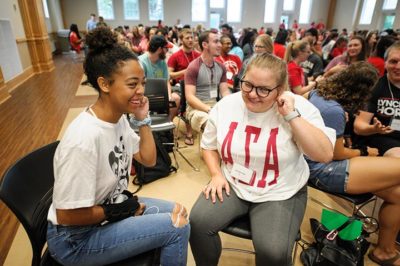A $52,000 grant from the Jessie Ball duPont Fund will help Lynchburg’s Office of Equity and Inclusion move forward with a brand-new project: Home for Hornets.
The one-year project will include a comprehensive institutional equity audit and educational programs on diversity, equity, and inclusion to “build a vibrant campus culture of equity and place,” Vice President for Inclusive Excellence Dr. Robert Canida II said.

“Even with the University’s growth since 1903, the challenges in creating an inclusive campus for all students, particularly marginalized and historically underrepresented students, faculty, and staff, still exist,” he explained in his proposal. “The University is not fully meeting the emotional and cultural needs of our campus stakeholders.”
Canida said that when he came to Lynchburg in December 2019, he quickly realized the need for a thorough audit to create a diverse, equitable environment everyone can call home.
That’s where the duPont Fund comes in, which has generously supported transformative initiatives at Lynchburg for many years.
“I’m really grateful the duPont Fund approved our Home for Hornets project through this grant,” Canida said. “This project will truly create a sense of place and belonging for all our stakeholders.”
Home for Hornets will be led by Canida and the Office of Equity and Inclusion, as well as key campus partners, including the President’s Task Force on Diversity, Equity, and Inclusion, the Inclusive Excellence Council, and others.
While equity assessments (such as the 2018 Campus Climate Survey) and programs (a DEI webinar series, collaborative work with the Office of Multicultural Services, etc.) have happened before at Lynchburg, Canida noted that Home for Hornets will accomplish two crucial pieces missing in the past: a comprehensive equity audit and DEI education at all stakeholder levels.
The University will partner with three leading equity organizations. TMI Consulting will conduct a comprehensive, six-to-eight-month institutional audit that will focus on all levels of stakeholders, beginning in January 2021. The Racial Equity Institute will host workshops in the spring. The National Coalition Building Institute, an international leadership organization that provides DEI educational sessions will contribute to long-term institutional and social change. Those sessions will begin next summer.
In addition to creating a “university of inclusive excellence,” Canida foresees Home for Hornets resulting in a thorough assessment and, if warranted, an overhaul of hiring practices. Through the president’s office, he is leading a Recruitment and Retention Task Force that plans to report those findings and recommend a major increase of students, faculty, and staff of color within the next five years.
As of last fall, Lynchburg’s faculty and staff were 87% white, according to a new diversity dashboard Canida has implemented on his office’s website.
It’s a big gap, but showing it — and knowing there is much work to do, as President Dr. Alison Morrison-Shetlar recently pointed out — is another step in the right direction for Canida.

